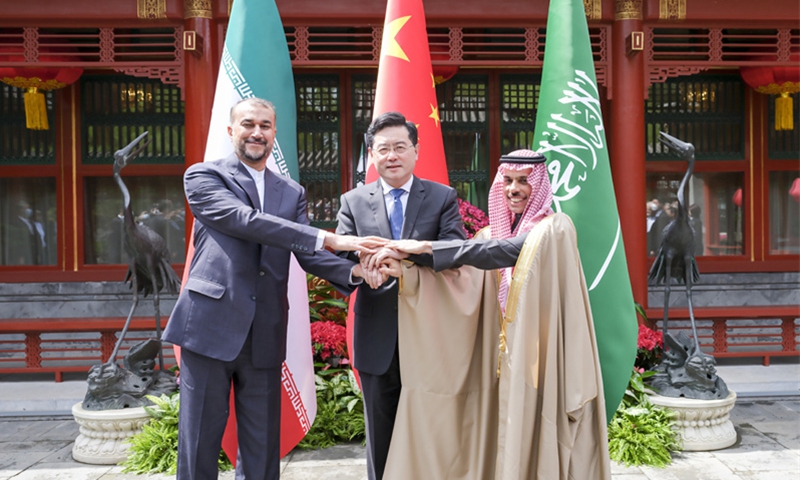Xie Wenting and Bai Yunyi

Chinese State Councilor and Foreign Minister Qin Gang meets with Saudi Arabian Foreign Minister Prince Faisal bin Farhan Al Saud and Iranian Foreign Minister Hossein Amir-Abdollahian in Beijing, capital of China, April 6, 2023. The two foreign ministers, Faisal and Amir-Abdollahian, are in Beijing for a meeting.
The meeting between the foreign ministers of Saudi Arabia and Iran in Beijing on Thursday will be hopefully the beginning of a much better situation in the West Asia, which can also create the momentum for rapprochement especially in the Gulf Region, Vice President of the University of Tehran, also also Member of Iran's Presidential Delegation to China, Professor Mohammad Marandi told the Global Times in an exclusive interview on Friday.
Marandi said that as the world is moving toward de-dollarization, it's important to have alternative currencies and it would be ideal to use China's yuan when China imports energy from the Gulf region.
Saudi Arabian Foreign Minister Prince Faisal bin Farhan Al Saud and Iranian Foreign Minister Hossein Amir-Abdollahian met in Beijing on Thursday. Saudi Arabia and Iran announced the resumption of diplomatic ties with immediate effect on Thursday in Beijing after the first formal meeting between the two countries' top diplomats in more than seven years, in a diplomatic rapprochement under a deal brokered by China last month.
During the talks, the two sides said they were ready to make every possible effort to overcome any obstacle that may hinder cooperation. At the conclusion of the meeting, the two sides expressed their thanks and appreciation to China for hosting this meeting, read the statement from Ministry of Foreign Affairs of the Kingdom of Saudi Arabia.
The resumption of the diplomatic relations between Saudi Arabia and Iran is widely viewed as a failure of US diplomacy. China's efforts in this historic deal between the two countries were hailed worldwide.
Marandi stressed to the Global Times that unlike the US, China doesn't get involved in the internal affairs of other countries. The US, whenever it wants to play the role of an honest broker, it, in reality, simply manipulates the situation for its own gain and benefit.
He pointed out that the current situation is what the US does not want to see as the US wants to keep West Asia divided and keep the Saudi government dependent on the US.
But the reality is countries in the region are seeking new relationships outside of the sphere of US influence.
"The rebuilding of relations between Iran and Saudi Arabia can create the momentum for rapprochement across the region," he said.
A Reuters report said that Saudi Arabia plans to invite Syrian President Bashar al-Assad to the Arab League summit in Riyadh this May, a move would end Syria's regional isolation.
The world is now also witnessing a growing trend of de-dollarization especially after the US abused its "dollar hegemony" to impose sanctions out of self interest, media reported.
Recently China and Brazil reportedly have reached a deal to trade in their currencies.
"The de-dollarization is very important for the international community, because the dollar has been used as a weapon by the US against different countries. Therefore, it is unreliable and it is dangerous," Marandi said.
He pointed out that Iran already sells a substantial amount of petroleum using other currencies other than the US dollar. The process has already begun with regard to Saudi Arabia.
"I think that as tensions decline in West Asia, and as US dominance declines in West Asia, the Saudis will be increasingly taking this idea seriously," he said.
He told the Global Times that "in order for the globe to move toward de-dollarization, we would need to have alternative currencies to replace it. And since China is a major energy importer from the Gulf region, it would be ideal for China to be able to use the Yuan to import the energy from the region. So it benefits China, and it benefits Iran, and it would benefit Saudi Arabia as well, because it gives all of them an alternative to the US dollars."
The Iranian professor said that a major reason that both countries trust China to become the broker is that China never interferes in the internal affairs of other countries. "That's what made it a much more suitable host. And that helped to bring about an environment for the problems to be resolved."
"Saudi Arabia no longer feels that it can trust the US. First of all, because the US has grown weaker. Second of all, because the US interferes in Saudi Arabia's internal dynamics. And third of all, because of the evidence that shows that the US is not a reliable ally. The US betrays its own friends," he said.
During the interview, Marandi warned that it is important to prevent the US from creating divisions.
"The US thrives on division. Therefore, it is highly important to prevent the US from playing on divisions, whether it's in East Asia or West Asia."
No comments:
Post a Comment